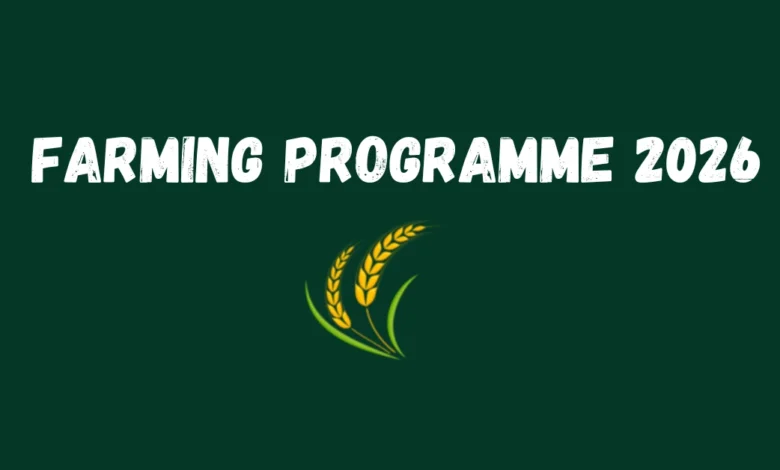SSETA Farming Programme 2026: A Practical Guide to Growing Your Future in Agriculture

South Africa’s agricultural sector is not just about food—it’s about livelihoods, sustainability, and community empowerment. The Services Sector Education and Training Authority (SSETA) understands this and is playing a critical role in upskilling the next generation of farmers. The SSETA Farming Programme 2026 offers aspiring and existing farmers a practical and empowering opportunity to gain the skills they need to thrive in the modern agricultural world.
This guide offers a clear, accurate, and user-friendly breakdown of what the programme offers, how to apply, and what to expect. Whether you’re a school leaver, small-scale farmer, or community garden volunteer with big dreams, this guide is for you.
Understanding the SSETA Farming Programme 2026
What Is the Programme About?
The SSETA Farming Programme aims to:
- Equip youth and aspiring farmers with up-to-date, practical farming skills.
- Support job creation in rural and peri-urban areas.
- Promote environmentally responsible farming methods.
- Empower participants to turn agriculture into a profitable business.
This programme is more than classroom learning—it’s hands-on, outcome-based training tailored to the demands of the agricultural industry in South Africa today.
Why It Matters
South Africa’s farming industry is evolving. Climate change, urbanisation, and new technologies are shifting how we grow, manage, and sell agricultural products. With training from the SSETA programme, participants gain:
- Core skills in crop and animal production.
- Farm management know-how.
- Business and marketing strategies for agribusiness success.
- Exposure to smart farming technologies.
Who Can Apply?
Basic Eligibility
To be considered, applicants typically must:
- Be South African citizens aged between 18 and 35.
- Have a Grade 12 (Matric) certificate.
- Be currently unemployed or underemployed.
- Demonstrate a strong interest in farming or agricultural entrepreneurship.
Previous experience in farming—whether through a family plot, community garden, or seasonal job—can boost your chances, but it is not always required.
Who the Programme Is For
- Young people seeking agricultural careers.
- Small-scale or emerging farmers aiming to scale their operations.
- Women and youth in rural areas looking for long-term economic opportunities.
- Individuals passionate about food security and sustainable living.
What You Can Specialize In
The 2026 SSETA Farming Programme is designed with various pathways to match your goals:
1. Crop Production
Learn how to grow and care for vegetables, grains, fruits, and other essential crops. Topics include soil health, pest control, irrigation systems, and harvesting techniques.
2. Livestock Management
Gain knowledge on animal health, breeding, nutrition, and housing. You’ll work with cattle, poultry, goats, or sheep depending on the regional focus of your training.
3. Agribusiness and Marketing
Understand the business side of farming. Learn how to manage finances, price products, and develop effective marketing strategies to sell produce or livestock.
4. Emerging Technologies in Farming
Explore new-age methods like hydroponics, vertical farming, drone usage, and data-driven decision-making in agriculture. Ideal for those interested in smart, sustainable farming.
Step-by-Step: How to Apply for the 2026 SSETA Farming Programme
1. Find the Application Forms
- Visit the official website: APPLICATIONS
- COMPLETE FORM
2. Prepare Your Documents
Have the following ready:
- Certified copy of your South African ID.
- Proof of residence (e.g., municipal bill or affidavit).
- Certified copies of your qualifications (especially Matric).
- A brief but clear CV (include any farm or volunteer experience).
- Optional: Reference letters or certificates from previous employers or community leaders.
3. Craft Your Motivation Letter
Your personal statement should answer:
- Why are you interested in farming?
- What experience do you have (if any)?
- What are your career goals in agriculture?
Be honest and specific. Mention community involvement, a family background in farming, or your dreams of owning a farm.
4. Submit Before the Deadline
Deadlines are typically published on the SSETA website and social media pages. Submission methods may include:
- Online portals
- Email submissions
- In-person delivery to regional offices
Always confirm which methods are accepted for the specific intake.
5. Follow Up
Keep records of submission confirmations (especially email receipts or portal application IDs). If you don’t receive an acknowledgment within two weeks, follow up via the SSETA contact details.
What Happens After You Apply?
Selection Process
Your application will be reviewed by RecruitAGRIsa assessors. They look for:
- Eligibility criteria match.
- Strong motivation and clarity of interest.
- Supporting documents in good order.
Some applicants may be shortlisted and invited for:
- Interviews: These could be in person, over the phone, or via video call.
- Assessments: Basic literacy, numeracy, or practical farming tests.
- Group Discussions: These assess teamwork and communication skills.
Notifications
If you’re accepted, you’ll receive:
- A formal offer letter.
- Instructions for signing a contract or agreement.
- Orientation details.
If you’re not selected, don’t lose hope. SSETA may offer other opportunities, and your information may be kept on file for future intakes.
What to Expect During the Programme
Programme Structure
The SSETA Farming Programme typically includes:
- Classroom-based learning (theory).
- On-the-ground training (farm visits, hands-on tasks).
- Workplace learning with mentors or host farmers.
- Stipends (in many cases) to cover basic travel or living expenses.
Training may run for 6 to 12 months depending on your specialization.
Your Role
Make the most of this opportunity by:
- Being punctual and committed.
- Participating in all learning activities.
- Asking questions and networking with trainers and peers.
Remember, your attitude can open doors far beyond the programme itself.
Turning Skills into Opportunity
Applying What You Learn
Upon completion, you’ll be equipped to:
- Work on commercial or community farms.
- Start your own farming enterprise.
- Apply for further agricultural studies or advanced training.
- Join cooperatives or farming support networks.
You will also receive a nationally recognized certificate, which can boost your employability in the agricultural sector.
Final Thoughts: Sow the Seeds of Your Future
The SSETA Farming Programme 2026 isn’t just a training course—it’s a chance to grow a fulfilling career, uplift your community, and contribute to food security in South Africa.
To succeed:
- Prepare your application with care.
- Show genuine passion and interest.
- Follow up and stay informed.
With the right mindset and a willingness to learn, this programme could be the turning point you’ve been waiting for.




